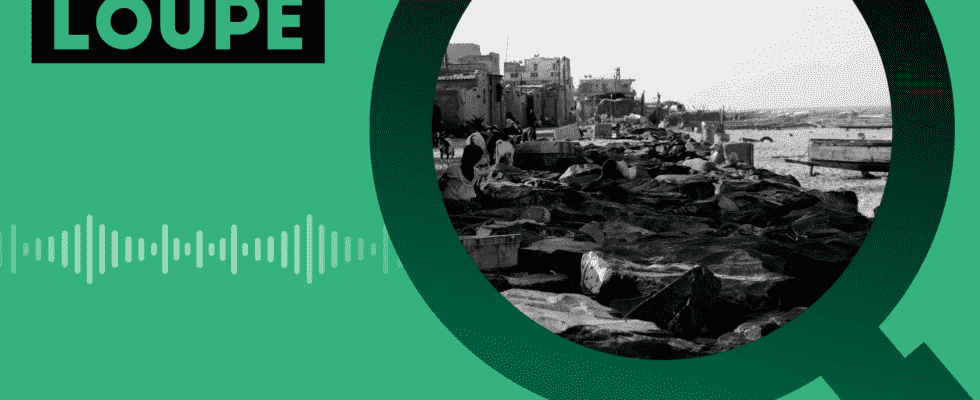In this new episode of La Loupe, Xavier Yvon deciphers the challenges of energy transition in Africa with Charlotte Lalanne, journalist for the World service, and Lucas Mediavilla, Energy specialist at L’Express.
Listen to this episode and subscribe to La Loupe on Apple Podcasts, Spotify, Deezer, Google Podcasts, Podcast Addict and Amazon Music.
The team: Xavier Yvon (presentation), Charlotte Baris (writing), Mathias Penguilly (editing) and Jules Krot (directing).
Music and design: Emmanuel Herschon/Studio Torrent
Image credits: Charlotte Lalanne/L’Express
Logo: Anne-Laure Chapelain/Benjamin Chazal
How to listen to a podcast? Follow the guide.
Xavier Yvon: Charlotte Lalanne, from the World service of L’Express, left me some coordinates, I hurry to enter them in the teleporter and off we go…
Charlotte Lalanne: Ah Xavier you are right on time!
Xavier Yvon: Hi Charlotte! It’s very nice where you took me. We’re by the sea, and with this heat it’s like being on the Côte d’Azur in the middle of summer. We are far from Paris, aren’t we?
Charlotte Lalanne: Yes we are in Saint-Louis, in the north of Senegal. More precisely on the beach of Guet Ndar. Saint-Louis is a city classified as a UNESCO World Heritage Site, it is called the little Venice of Senegal. Follow me, I’ll show you behind the scenes of this landscape.
Xavier Yvon: What are those big stones all along the beach, a few meters from the houses?
Charlotte Lalanne: This is called a rockfill dike. We laid 2 kilometers long on this beach huge blocks of basalt sunk 15 meters under the sand and above, that’s what you see there… It’s an artificial dike that was finished at the last summer to protect homes from the ocean…
Xavier Yvon: Because the area is very exposed?
Charlotte Lalanne: Extremely exposed even! The sea advances by 1 to 5 meters per year here, on this Senegalese coast, and Saint-Louis is particularly threatened: the beach on which we walk, with its beautiful canoes of all colors, is the language of barbarism, which is somewhat the equivalent of the Lido in Venice, ie a natural barrier between the ocean and the Senegal River. Basically, if this sandbar is engulfed by water, the city of Saint-Louis will be directly threatened.
Xavier Yvon: And like in Venice, is it because of coastal erosion?
Charlotte Lalanne: Yes, so in fact coastal erosion is a natural phenomenon but here it is accelerated by human activity on all this West African coast: galloping urbanization, extraction (legal and illegal) of sand… All the people who live behind the dike are very worried. Some have already seen their houses collapse and are relocated to temporary camps, so there are already climate refugees. And this threat exists elsewhere on the coast of Senegal, especially where the main source of income was tourism… but tourism without a beach is less dreaming…
Xavier Yvon: And I guess you brought me here to talk about adapting to global warming, Charlotte.
Charlotte Lalanne: Not exactly. Saint Louis is the symbol of the African paradox: the continent least responsible for greenhouse gas emissions, and yet the first to be affected… What you see here is one of the many illustrations of this situation. Except that adaptation is not enough, and the continent therefore has no choice. Africa must accelerate its energy transition. And that has not only ecological consequences but also on economic development. Especially when you see the wealth in terms of resources in the region…
Xavier Yvon: I would have liked you to continue your explanations in the sun and by the sea Charlotte, but I think it’s time to take the teleporter and return to Paris…
Charlotte Lalanne: Yes, and I took the liberty of inviting someone else into the studio. You will see when you arrive.
For further
PODCAST. Energy transition: headwinds are blowing on French wind power
PODCAST. The day when science will lower the thermostat of the world
Energy transition in Africa: these inconvenient truths
COP27: should Africa bet everything on the exploitation of gas?
COP27: “For the countries of the North, the financing tap is not so easy to turn on”
Global warming: the last warning shot from the UN on the eve of COP27
